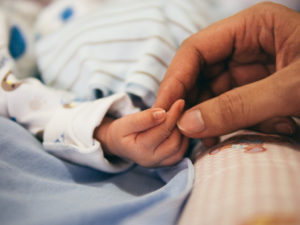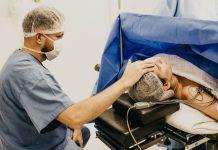Disclaimer :: Dr. Catherine Bevan, a local OB/Gyn, sponsored and created this post based on her expertise.
Imagine this scenario: You have been in labor for hours and hours and then you start pushing for a couple more hours with painful contractions. Finally, the joyful culmination of nine months of hard work is imminent. Every ounce of your energy has been channeled into a singular event — childbirth. It’s easy to get caught up in the moment, so most mothers and their partners have no idea what happens immediately after the baby is born.
Several important steps occur right after delivery to help ensure your little one comes into the world healthy. First, bulb suction is used to remove the fluid out of the baby’s mouth and each nostril. Second, two cord clamps are placed on the umbilical cord, stopping the transfer of blood from the placenta to the newborn. Finally, the cord is cut (usually by an overwhelmed significant other), officially separating the baby from the mother.
The question of when to clamp the umbilical cord after delivery is one I get quite often in my clinic. Specifically, many patients ask me whether or not they should delay clamping the umbilical cord longer than what is typically done by obstetricians.
 Traditionally, convenience dictated the timing of clamping the umbilical cord. In the absence of maternal or fetal medical emergency, clamping was usually performed within 30 seconds of delivery. Delaying this clamping leads to more blood crossing from the placenta to the fetus, increasing blood volume. In the last five years, research has been published that suggests a possible benefit of waiting to clamp the cord. The evidence supporting delayed cord clamping is quite strong when dealing with preterm births (born before 37 weeks gestation). Delaying by at least 30 seconds has been shown to result in fewer infants requiring blood transfusion, a lower risk of necrotizing enterocolitis (a potentially fatal infection of the intestine), and a lower risk of intraventricular hemorrhage (bleeding into the brain).
Traditionally, convenience dictated the timing of clamping the umbilical cord. In the absence of maternal or fetal medical emergency, clamping was usually performed within 30 seconds of delivery. Delaying this clamping leads to more blood crossing from the placenta to the fetus, increasing blood volume. In the last five years, research has been published that suggests a possible benefit of waiting to clamp the cord. The evidence supporting delayed cord clamping is quite strong when dealing with preterm births (born before 37 weeks gestation). Delaying by at least 30 seconds has been shown to result in fewer infants requiring blood transfusion, a lower risk of necrotizing enterocolitis (a potentially fatal infection of the intestine), and a lower risk of intraventricular hemorrhage (bleeding into the brain).
The evidence for delaying clamping in term infants (born after 37 weeks gestation) is not as sound. Delayed cord clamping results in higher hemoglobin levels and a lower incidence of iron deficiency but also results in a 40 percent increase in the need for phototherapy to treat jaundice. Delaying also inhibits the collection of cord blood for banking, if desired. There is also weak evidence showing a possible benefit in neurodevelopment, but not enough to recommend routine use of the practice.
In general, the ideal time for cord clamping after delivery, even after years of debate, has yet to be definitively established. More research is needed to evaluate the optimal time to clamp the umbilical cord. In practice, delaying clamping is routine in preterm infants, but not typically done after term deliveries. As always, communication and open dialogue with your obstetrician is critical for the best outcomes for you and your baby!

Dr. Catherine Bevan is a board certified obstretician and gynecologist, who practices in Tarrant County, with offices in Fort Worth and Willow Park. She is a Fort Worth native and received her Bachelor of Arts degree from Washington University in St. Louis where she graduated cum laude, Phi Beta Kappa. She then returned to Texas to complete her medical degree at UT Southwestern as well as her residency training at Parkland Memorial Hospital. She also spent an additional year as an assistant professor at UT Southwestern, specializing in gynecologic surgery and emergency women’s care. Providing excellent service to her patients is a passion for her as she guides them to the best possible healthcare outcomes.
You can read more from Dr. Bevan on the Fort Worth Moms Blog archives.
Please visit her websites for more information: www.healthcareoftexas.com and www.txhealthcare.com.
You can contact Dr. Bevan at:
- 1250 8th Avenue, Ste 320 // Fort Worth, TX 76104 // (P) 817-924-2111 // (F) 817-564-3980
- 134 El Chico Trail, Suite 103 // Willow Park, TX 76087 // (P) 817-441-1644 // (F) 817-441-1626













